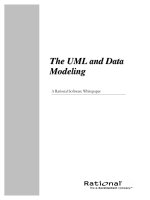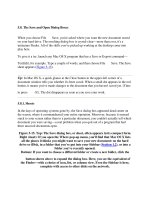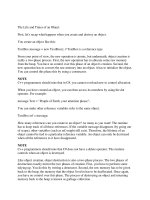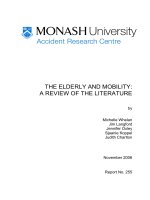Tài liệu THE LAW AND ECONOMICS SPORT : 2ND Level Master Degree pdf
Bạn đang xem bản rút gọn của tài liệu. Xem và tải ngay bản đầy đủ của tài liệu tại đây (52.11 KB, 8 trang )
THE LAW AND ECONOMICS SPORT - FACULTY OF LAW
1/8
FACULTY OF LAW
THE LAW AND ECONOMICS SPORT
2
ND
Level Master Degree
Academic Year 2006/2007
V Edition
THE LAW AND ECONOMICS SPORT - FACULTY OF LAW
2/8
DIRECTION AND SCIENTIFIC COMMITTEE
Director: Prof. Angelo Rinella
Coordinator: Prof. Guido Valori
Scientific Committee: S. Ecc. Rev. Monsignor Salvatore Boccaccio, Prof. Giuseppe Dalla Torre,
Prof. Giovanni Giacobbe, Dr. Raffaele Pagnozzi, Dr. Mario Pescante, Dr. Giovanni Petrucci
PATRONAGE
Presidency of the Council of Ministers
PARTNERS
ACI - Automobile Club d’Italia, AeCI - Aero Club d’Italia, CIP – Comitato Italiano Paralimpico,
FIBS - Federazione Italiana Baseball Softball, FICR - Federazione Italiana Cronometristi, FICK -
Federazione Italiana Canoa Kayak, FIDASC - Federazione Italiana Discipline Armi Sportive da
Caccia, FIGC - Federazione Italiana Giuoco Calcio, FIGH – Federazione Italiana Giuoco Handball,
FIH - Federazione Italiana Hockey, FIN - Federazione Italiana Nuoto, FIP - Federazione Italiana
Pallacanestro, FIPAV - Federazione Italiana Pallavolo, FIPSAS - Federazione Italiana Pesca
Sportiva e Attività Subacquee, FIS - Federazione Italiana Scherma, FISE - Federazione Italiana
Sport Equestri, FISI - Federazione Sport Invernali, FIT - Federazione Italiana Tennis, FITeT -
Federazione Italiana Tennis Tavolo, FITri - Federazione Italiana Triatlon, FMI – Federazione
Motociclistica Italiana, FMSI - Federazione Medico Sportiva Italiana, UITS - Unione Italiana di Tiro
a Segno, ADT - Corriere dello Sport, Lottomatica, Gioco del Lotto.
PROFESSIONAL PROFILE
Expert in sports law and the economic-business aspects linked to the world of sport.
PROGRAMME
The Master gives the understanding and skills necessary for the emerging professional
competences and specialisations in the world of sport (managers and company executives, sports
organisations and institutions, free lance).
ENTRY REQUIREMENTS
Specialist degree, degree from the old system or a degree from a foreign university recognised as
being equivalent.
STRUCTURE
• Maximum number of students: 60
• Minimum number of students: 30
• Total number of hours in course: 1,500 of which 300 hours in the lecture hall (taught
through lectures, practical exercises, assessment tests and visits to sports facilities and
structures)
• Final exams: written paper and oral exam
THE LAW AND ECONOMICS SPORT - FACULTY OF LAW
3/8
LECTURERS
University lecturers, magistrates, lawyers and experts working in the sector.
SYLLABUS
MODULE I
GENERAL THEORY OF THE SPORTS LEGAL SYSTEM
• The collocation of sports law
• Sports law as public law
• Sports law as private law
• The characteristics of the sports systems with respect to the common legal system and the
interaction of the common system with the sports system
• The effectiveness of sports regulations
• The persons subject to sports regulations
• The language of sport
• Bioethics of sport
MODULE II
THE SOURCES SYSTEM
• Sources and principles: the micro-system of sport
• International and community sources
• The principles of sports law in the Italian legal system:
a) reference framework and constitutional principles
b) normative sources
c) Act 426/42 (establishment of CONI as a public body)
d) The Melandri Act amended by Leg. Decree No. 15 of
e) 8/01/2004 and the reform of sports law
f) The new principles of sports law in sports regulations
• Statutory and regulation sources:
a) the CONI statute
b) the federal statutes
c) the CONI regulations
d) the federal regulations
e) the administration and accounting regulations of CONI and national sports
federations; the industrial plan and the contract between CONI and CONI Servizi
SpA
MODULE III
COMPARATIVE SPORTS LAW
• The International Olympic Committee
• The International Federations
• Relations between international organisations and national bodies
• The Sports Arbitration Court of Lausanne
MODULE IV
1) THE PARTS OF THE SPORTS SYSTEM: THE ORGANISATIONS
• The institutional bodies
• CONI - CONI Servizi SpA
• The national sports federations
THE LAW AND ECONOMICS SPORT - FACULTY OF LAW
4/8
• The Italian Sports Federation for the disabled
• The Italian Paralympics Committee
• The sports companies leagues
• The spectators associations
• The sports disciplines in association with CONI
• The sports promotion agencies
• The BENEMERITE companies
• UNIRE
• The Ministry of Sport and its competences
2) THE OTHER PARTS OF THE SPORTS SYSTEM
• The sports companies and associations
• The members:
a) the athletes
b) the technicians
c) the referees
• Sports professionalism:
a) with reference to sports companies
b) with reference to the athletes
c) Act No. 91/81 and the proposal for reform
d) outline of the problem of professionalism with reference to the other categories
• Sports amateurism
• The “phenomenon” of the sports agent
• The reform of the figure of the Sports Agent
3) THE GOVERNMENT OF SPORT:
THE DIFFERENT PARTS AND THE ORGANISATION; THE INTERNATIONAL AUTHORITIES
AND THEIR STRUCTURE;
• CONI
a) the president of CONI
b) the national council
c) the CONI committee
d) the secretary general
e) the board of auditors
• CONI Servizi SpA
a) the president
b) the board of directors
c) the managing director
d) the director general
e) the auditors
• The national sports Federations:
a) the general assemblies
b) the federal president
c) the federal council
d) the secretary general
e) the board of auditors
f) the organisations of the sector
g) the organs of justice
h) the organs of control
• The territorial organisation:
THE LAW AND ECONOMICS SPORT - FACULTY OF LAW
5/8
a) the territorial committees of CONI and sports federations
b) the territorial assemblies:
c) the organs of territorial justice
• The Ministry of National Heritage and Culture
• The role of the European Community in sport
4) THE PROCEEDINGS AND ACTIVITIES
• The proceedings and provisions
• The obligation of affiliation
• The obligation of membership
• The recognition of the sports discipline in the context of the sports legal system
• Sports activities:
a) sports facilities: their construction, maintenance
b) and management. The recourse to sports credit
c) the organisation and management of sports tournaments
d) the organisation and management of sports championships
MODULE V
ECONOMIC- BUSINESS PROFILES OF SPORTS
• Sponsoring
• Merchandising
• The right of “license”
• The commercialisation activities of radio-television rights
• Proposals for reform of the distribution of television rights and new technologies
• Marketing
• The use of new technologies and new communication systems
• Advertising and sports diffusion
• Patronage and promotion
• Marketing in sports facilities
• Image and institutional communication
• In-company institutional relations
• Group dynamics and team work
• Training of personnel and collaborators
MODULE VI
CONTENTIOUS JURISDICTION
• The new principles of sports justice; classification of sports justice
• The relations between sports justice and ordinary justice
• Breaches of the law in sport – principles and a brief case record
• Sports sanctions - principles and a brief case record
• Common essential lines of the procedure before the organs of sports justice
• Common essential lines on the competences of the organs of sports justice in relation to
the phase and degree
• The validity and effectiveness of the sports sanctioning provision
• The arbitration clause
• Sports arbitration
• The chamber of settlement and arbitration for CONI sport
• Act 280 of 2003: examination, assessment and positive applications
MODULE VII
THE LABOUR RELATION IN THE WORLD OF SPORT
• The protection of rights
• Labour disputes
THE LAW AND ECONOMICS SPORT - FACULTY OF LAW
6/8
• The BOSMAN sentence
• The subject of access for athletes who are non-EU nationals and new EU citizens
• The subject of access for athletes who are non-EU nationals
• The position of the EU with regard to sport
• The right to work and the protection of young athlete nurseries
MODULE VIII
DOPING:
THE JURIDICAL AND ECONOMIC IMPLICATIONS
• The problem of doping at national and international level
• Medical-scientific issues
• Juridical issues:
a) the repercussions form the sports sanctions point of view
b) the repercussions from the point of view of the violation of regulations of common
right
• CONI’s anti-doping power of attorney and anti-doping regulations
• The anti-doping commission
• The anti-doping laboratory
• Act 376/2000
• The W.A.D.A. (World Anti-doping Agency)
MODULO IX
THE FINANCIAL AND ECONOMIC RESOURCES
• CONI’s economic resources:
a) football pools
b) betting
c) state financing
d) CONI Servizi S.p.A.: projects, development, affiliated controlled companies
• The economic resources of the sports federations, affiliated disciplines, sports promotion
organisations:
a) CONI contributions
b) self-financing
I. membership
II. sponsoring
III. sale of promotion-advertising and radio-television rights
IV. marketing and merchandising
• The Institute of Sports Credit: history, work, objectives
• The taxation system in sport:
a) the law on amateurism and the facilitations in the 2003 finance law
b) the law on professionalism
c) the social security system – Enpals
MODULE X
CIVIL LIABILITY IN SPORT
• Sport and the intrinsic risks connected with it
• Civil liability in the management of sports facilities
• Outline of third-party liability:
a) towards the athletes
b) towards the technicians
c) towards the medical and paramedical staff
d) towards a third-party
e) the role of the social doctor
THE LAW AND ECONOMICS SPORT - FACULTY OF LAW
7/8
f) insurance for sportsmen - Sportass and the other forms of insurance
MODULO XI
CRIMINAL LIABILITY IN SPORT
• The risks of the activity and the relationship with criminal liability
• The justification of the exercise of sport
• Criminal liability in the management of sports facilities
• Important criminal profiles in sport:
a) professional sport
b) amateur sport
ADDRESS
LUMSA – Faculty of Law
Via Pompeo Magno, 22 - 00192 Roma
DURATION
November 2006 – June 2007
TIMETABLE OF LECTURES
Friday 14.30-19.30 / Saturday 9.00-12.30
ENROLMENT
Last day for enrolment: 31 October 2006
Admission to the Master, up to the maximum number of places available, will depend on the
assessment of the documents received, according to the order of arrival of the applications at the
Master’s Office
Candidates will be informed of their admission/non-admission to the Master by e-mail
The go-ahead for the Master and the beginning of lectures will be published on the LUMSA site
The application for enrolment, together with documentary evidence of qualifications must be sent
to the following address:
LUMSA - Segreteria Master e Corsi di Perfezionamento
Via Pompeo Magno, 22 – 00192 Roma
Applications without the requested documentary evidence of qualifications enclosed will not be
taken into consideration.
The application for enrolment can be found at www.lumsa.it
or at the Master’s and Specialisation Courses Office
Enrolment for the Master is incompatible with other degree courses, Masters,
Specialisation Courses, Specialisation Schools and Ph. D. Courses
THE LAW AND ECONOMICS SPORT - FACULTY OF LAW
8/8
ENROLMENT FEES AND PAYMENT
Cost: € 3.500.00 payable in five instalments
I instalment: € 700.00 at the time of enrolment
reimbursable in the case of failure to start/non-admission to Master
II instalment: € 700.00 (by 30.11.06)
III instalment: € 700.00 (by 31.01.07)
IV instalment: € 700.00 (by 31.03.07)
V instalment: € 700.00 (by 31.05.07)
Payments can only be made by bank transfer to:
LUMSA - UniCredit PB
Reference: 7485 – ROMA Parioli
Account No. 60005491 ABI 03223 CAB 03202 CIN J
specifying in the description of payment your name, surname and title of Master.
Copies of the bank receipt of the bank transfers must be taken to the Master and Courses Office.
GRANTS
Grants are allocated to cover partial payment of the enrolment fee.
Once enrolled for the Master, no refund of the instalments already paid is due in the case of
renunciation. (The payment by instalments of the enrolment fees is only a concession for
students: therefore, any renunciation does not exempt students from the whole amount of the
enrolment fee).
AWARDS
• 60 University Credits
• Title of 2nd level Master in “Sports Law and Economy” (attendance not below 80% of the
total number of lectures and final exams)
TRAINEESHIPS
Students have the possibility of training periods in organisations, organs and associations of the
sports world.
INFORMATION
LUMSA - Masters and Specialisation Courses Office
Via Pompeo Magno, 22 -00192 Roma
Tel. 06-68422467 Fax 06-68422484
www.lumsa.it
Prof.Guido Valori
Tel. 06-37513621
Dr. Federica Capone
Tel. 06-68422978









